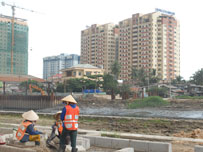
| Buyers advised rational behavior in real estate market | |
As the real estate sector warms up and anxiety rises about inflationary prices, Deputy Minister of Construction Nguyen Tran Nam says buyers should rely on professional advice and not bank on market rumors. “After a long freeze [over the past year], the number of property transactions and prices have edged up. It is inevitable,” Nam said. He said the real estate market recovery is backed by high housing needs and signs that the economy has bottomed out. “Demand for housing is strong and there is still a big gap between demand and supply,” Nam said. “In Vietnam, the per capita housing area is 12 square meters while it is 30 square meters in other countries.” Markets of soft-price apartments and land for construction projects in Ho Chi Minh City and Hanoi have been heating up in recent weeks. Immediately after the Dat Xanh Real Estate Service and Construction Corporation launched the first phase of its Babylon Residence project in HCMC’s Thu Duc District with 100 apartments last Sunday, it sold 96 at VND14.5 million (US$816.2) per square meter. Also last week, Tan Binh Construction Investment Company sold 100 apartments of its Tan Mai Building project in HCMC’s Binh Tan District at VND10-12 million per square meter. In the first week this month, land prices at several projects in new District 7 development areas rose 4-6 percent compared to May. “The residential market is improving because a large volume of mid-income people have found current prices much lower than the overheated prices of 2006-07,” Vietnam News quoted Pham Si Liem, vice chairman of Vietnam Federation of Civil Engineering Associations, as saying. “Everyone is trying to manage credit to buy a piece of land or a house. They are worried about not be able to own if the market overheats again,” Liem said. Questioned why Vietnam’s real estate market is not developing normally as it either freezes or becomes overheated, Nam said it was psychological buying that was driving the market. “Vietnamese people are easily affected by rumors [about the market trends] and lack analysis, and not just in the property market,” he said. Nam said though the real estate market could generate high profits, it was very dangerous if investors were to buy properties based on market rumors. He said while the government is responsible for perfecting legal documents to prevent speculation and giving enough information on the market to direct home buyers, the buyers themselves should “adjust their behavior.” If home buyers do not know enough about the property market, they should access consultants, he said. “We are running on a trial basis (the calculating of) the real estate market’s indicators – such as indices of trading volumes and prices – to measure the temperature of the market so that individuals and entrepreneurs can use them for their trading or investment decisions,” Nam said. He said the market freeze over the past year made such “measuring” a challenging task. “As the market warms up, we will accelerate this work to release the indices soon,” he said. Housing prices in Vietnam are very high compared with residents’ incomes, Nam noted. He said while residents in foreign countries need 15 years of work to buy a house or apartment, Vietnamese people need 30-40 years. Nam said the National Assembly has recently ratified amended construction-related laws which cut investment time and costs, helping lower housing prices. The Deputy Minister of Construction also said the government is supporting the development of the low-income housing market to reduce the gap between demand and supply. Earlier this month, the ministry reported 20 low-income housing projects nationwide will break ground in June, and several others in the third quarter of the year that are expected to be completed in late 2010. Viet Kieu housing rules good for market Nam said the newly approved legal amendments to grant greater home ownership rights to overseas Vietnamese would have “positive impacts” on the local real estate market. The amendments would not only tighten relationships of overseas Vietnamese, known as Viet Kieu, with their home country, but would also “help the property market grow.” From September 1, certain categories of Viet Kieu will be allowed to own an unlimited number of homes in the country under amendments to the Housing Law and Land Law passed last week by the National Assembly. It includes those who still retain their Vietnamese citizenship, overseas Vietnamese investors, scientists, and others with special skills. The Vietnamese diaspora is estimated at about three million people with many in the US, Canada, France and Australia. But during the three years since the Housing Law took effect in 2006, only 140 have bought houses in Vietnam. “Many people have shown concern that the amendments would lead to speculation, but they shouldn’t worry,” Nam said. “We have enough instruments to prevent any attempts to hoard real estate, like taxes. Meanwhile, as I have said, property prices in Vietnam are high now, so it’s not profitable to speculate on real estate.” | |
| VnInfoGate.Com |
